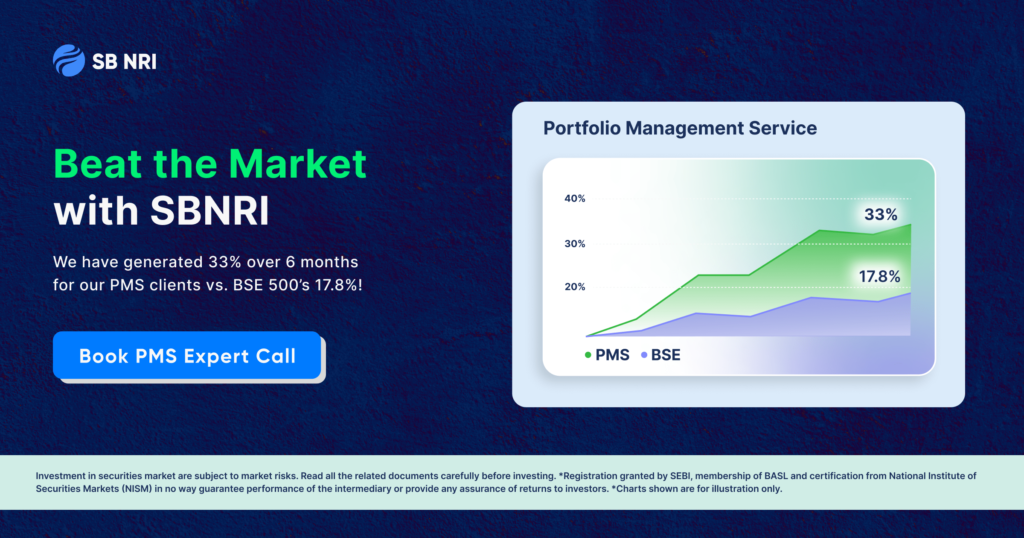
We’ve seen many NRIs ask about the best investment option between Mutual Funds vs Equity for NRIs. With the NRI investing scene growing in India further, investing in Indian markets has become easier for NRIs. Today NRIs have different investment options to choose from, of which NRI mutual funds and equities are a few notable ones apart from commercial real estate, pre-IPO, and more. In this article, we specifically, look into the comparison between mutual funds vs equity for NRIs, key features, differences, and the reason for the best investment option for NRIs among these two.
Also read: Best NRI Investments in India: Top 10 Investment Options for NRIs/OCIs in India 2024
What are Mutual Funds for NRIs?
Mutual fund is an investment fund that collects money from many investors to purchase securities, such as stocks, bonds, debt instruments, money market instruments, etc. The investment pool is managed by a professional fund manager or team, who makes assessments of the type of securities to invest in. The investor owns a share of the mutual fund, which generates returns depending on the performance of the underlying assets.
Professional fund managers with in-depth knowledge of markets and different types of securities build a diversified portfolio to generate maximum returns for investors. Hence, investors don’t need to study the stock market.
The market value of the portfolio is determined depending on the price movement of the underlying assets. The portfolio value, also known as net asset value (NAV), is calculated by dividing the total net assets of the fund by the number of outstanding units. A higher NAV means the portfolio gains and a lower NAV reflects a loss in the portfolio value.
Just like residents, NRIs can invest in mutual funds in India by completing their NRI Mutual Fund KYC and linked to their NRO/NRE Bank accounts.
Also read: Best Mutual Funds for NRI in India 2024
What is Equity Investment for NRIs?

NRI investors who are ready to take some risk in the stock market can consider investing in equity. Non-resident Indians can directly invest in the stock market in India under the Portfolio Investment Scheme (PIS) of the RBI.
Also read: PMS for NRI: A Comprehensive Overview
NRIs need to have the following accounts for equity investments:
- Non-Resident External (NRE) Account
- Non-Resident Ordinary (NRO) Account
- NRI Demat Account
- NRI Trading Account with a registered broker
Dividend income and the capital gains earned by NRIs from shares and equity-oriented schemes of mutual funds are taxed in India. Find the capital gains tax on shares purchased by NRIs.
Also read: Best PMS Services for NRIs in India: Updated List 2024
Difference Between Mutual Funds vs Equity for NRIs
| Mutual Funds | Equity (Portfolio Management Services) |
|---|---|
| Mutual fund units can be purchased by placing a request with the fund house. | There is no pooling of funds in the PMS model. There is a separate portfolio for every client along with their Demat accounts. |
| MFs are actively managed by fund managers or professionals. | These are managed by portfolio managers. |
| Mutual funds have some minimum lock-in time, selling units before this may incur a penalty. | Investors investing in the PMS scheme can withdraw their funds at any time. |
| Mutual funds can be broadly categorised into three different types; equity, debt, and hybrid funds. | There are three types of services in PMS namely Discretionary, Non-discretionary, and Advisory. |
| Mutual funds have many tax liabilities. | Equity PMS – Short-term capital gains will be taxed at 15% and any long-term capital gains will be taxed at 10% without indexation benefits. Debt PMS – For listed securities, you have the benefit of long-term capital gains taxation, after 1 year, and 1 day as compared to three years in debt mutual funds. |
Also read:
Mutual Fund vs. ETF: What is best for NRIs
AIF vs PMS: What is the Difference?
How can NRI invest in Mutual Funds in India?
To invest in mutual funds in India, you need to fulfill FEMA guidelines for being an NRI. Some key points for NRI investment in mutual funds are as follows:
- Investment can be made through a Non-Resident External account or a Non-Resident Ordinary account
- Investment is possible in Indian National Currency (INR) only and not in a foreign currency
Also read: Best SIP to Invest in 2024 – Top 10 SIP Mutual Fund Plans for NRIs/OCIs
What is best between Mutual Funds vs Equity for NRIs?
People invest their hard-earned money in different financial tools with varying objectives in mind. Achieving your financial goals is one of the most vital tasks to perform. There are several financial tools available to help you achieve your financial goals. NRI Mutual funds and Equity investments for NRIs are amongst the most popular ones. They offer you an opportunity to build a diversified portfolio. Depending on your investment horizon, risk appetite, financial goals, and tax-saving strategy, you can choose between these two options.
Also read: Top 5 Tips for NRIs to Pick a Winning Mutual Fund
Invest in NRI Mutual Funds In India with SBNRI
NRIs can now download the SBNRI App and choose to invest in different mutual fund options in India with ease. You can also get detailed investment advice from experts at SBNRI. Also, visit our blog and YouTube channel for more details.
SBNRI is an authorized Mutual Fund Distributor platform & registered with the Association of Mutual Funds in India (AMFI). ARN No. 246671. NRIs willing to invest in mutual funds in India can download the SBNRI App to choose from 2,000+ mutual fund schemes or can connect with the SBNRI wealth team to better understand Mutual Fund investments.
Disclaimer: SBNRI is a distributor of portfolio management services offered by SEBI registered portfolio managers. SBNRI is facilitating your investment and any assistance provided by SBNRI shall not be considered as advice/ recommendation. SBNRI does not intend to predict the success of the strategies. You are advised to read related documents and independently determine its suitability to your goals & investment objectives.
Also read:
Best Debt Mutual Funds in India 2024 for Residents and NRIs/OCIs
List of Top Performing Liquid Funds for NRIs in 2024
Best Equity Mutual Funds for NRIs to Invest in 2024
What are Sector Funds? Best Sector Funds List for NRIs
Investing in ESG Mutual Funds? Read this before you make a move
FAQs
Can NRI invest in the Indian stock market?
- Yes. NRIs can invest in the Indian Stock Market by buying stocks listed on the National Stock Exchange of India Ltd. (NSE). To be eligible to invest in stocks, NRIs need to have a PIS Account under the Portfolio Investment Scheme* (PIS) that will allow them to trade stocks. *(Portfolio Investment Scheme (PIS): Through this scheme of the Reserve Bank of India, NRIs can purchase and sell shares and debentures of Indian companies on a recognized stock exchange)
Can NRI invest in India with just a PAN Card?
- Yes, NRIs can use a PAN card and NRE/NRO account to invest in a mutual fund. To invest in shares, NRIs need an NRE account under PIS bank or NRO account, a bank account, and a Demat account.
Can NRI have 2 Demat accounts?
- Yes. An NRI can have multiple demat accounts. The usage of these multiple demat accounts can be understood under the concepts of:
1. Repatriation: NRIs must have separate demat accounts for repatriable (NRE) and non-repatriable (NRO) shares which means if you invest through your NRE account, the money you receive after selling the shares/stocks is completely and freely repatriable whereas investments through NRO accounts will have to be initially settled by paying applicable taxes and then they can be repatriated. NRE accounts are used to buy shares (equity) on a repatriable basis and NRO accounts are used to invest in shares (equity and derivatives) on a non-repatriable basis. The NRE/NRO Accounts can be used to invest in the primary market without PIS (Portfolio Investment Scheme) (eg: IPOs, Mutual Funds)
2. Market Variation: In order to invest in the secondary market you need a separate bank account to hold your investment funds that will be linked to the Portfolio Investment Scheme (PIS). This account can not be your regular NRE/NRO account and this account will be linked to a demat account to hold your shares as directed by RBI.
Is PIS mandatory for NRI?
- No, PIS permission is not required for an NRO (Non-Resident Ordinary) account. Previously, the NRI had to open NRE and NRO accounts under PIS regulated by RBI.
How can NRIs invest in India?
- Here are the steps an NRI can follow to invest in India:
1. Open an NRE or NRO (Non-Resident Ordinary) bank account: NRIs need to open an NRE or NRO bank account with an Indian bank to invest in India. An NRE account is used for investing foreign earnings that can be repatriated, while an NRO account is used for investments made from earnings in India that cannot be repatriated.
2. Obtain a Permanent Account Number (PAN): NRIs need to obtain a PAN card to invest in India. This card is required for opening a bank account, investing in the stock market, and purchasing property in India.
3. Complete KYC norms: NRIs need to complete the KYC (Know Your Customer) norms by submitting the necessary documentation such as a copy of their passport, address proof, and PAN card.
4. Choose an investment option: NRIs can choose to invest in various options such as stocks, bonds, mutual funds, real estate, and more. NRIs can also invest in the Indian stock market through the Portfolio Investment Scheme (PIS).
5. Ensure compliance with regulations: NRIs need to ensure compliance with all applicable regulations and laws when investing in India.
However, it’s recommended that NRIs consult with a professional financial advisor or tax consultant to ensure compliance.
What are the benefits of NRI investment in India?
- Given below are the benefits of investing in India for NRIs:
1. Diversification: Investing in India can provide NRIs with a diversification option outside of their home country. This diversification can help to minimize the overall risk in their investment portfolio.
2. High Growth Potential: India has a growing economy with many investment opportunities. With the rise of the middle class and increasing urbanization, there is a lot of potential for growth in various sectors such as real estate, infrastructure, and manufacturing.
3. Favorable Demographics: India has a young population, and with increasing disposable incomes, there is a significant demand for various products and services. This demographic advantage provides a huge potential for businesses and investments in the country.
4. High Returns: Historically, Indian investments have provided high returns to investors. The Indian stock market has outperformed many other markets over the past few decades, and there are many sectors that have the potential for high returns.
5. Tax Benefits: NRIs investing in India can take advantage of various tax benefits. For example, NRE accounts are tax-free, and NRIs can benefit from the Double Taxation Avoidance Agreement (DTAA) between India and their home country.
6. Repatriation of Funds: NRIs can repatriate the funds invested in India along with the profits earned from the investment, subject to certain conditions.
How can NRI invest in Indian Mutual Funds?
- An NRI can invest in Indian Mutual Funds using his/her NRE/NRO Account. The NRE Account is used to invest on a repatriable basis and the NRO Account is used to invest on a non-repatriable basis.
Can I invest from the USA in India?
- Yes an NRI can invest from the USA in India in various asset classes such as FDs, Mutual Funds, Stocks, etc.
Can NRI invest in SIP in India?
- Yes, an NRI can invest in India through the SIP route. SIP stands for Systematic Investment Plan.



